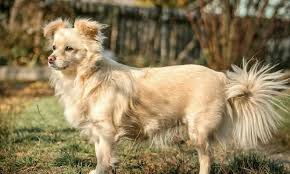
Alopekis
Conditions of detention
The Alopekis is highly adaptable and can thrive in both urban and rural environments. They do well in apartments as long as they receive adequate exercise.
Useful Fact: They are well-suited for small living spaces due to their compact size and moderate exercise needs.
Nutrition and diet
A balanced diet appropriate for small breeds is essential for the Alopekis. Their diet should include high-quality protein, healthy fats, and essential vitamins and minerals.
Useful Fact: Portion control is important to prevent obesity, a common issue in small breeds.
Health
Alopekis are generally healthy dogs with few genetic health issues. However, regular veterinary check-ups are important to maintain their well-being.
Useful Fact: They typically have a long lifespan, often living 12-15 years or more with proper care.
Grooming and care
The Alopekis has a short to medium-length coat that requires minimal grooming. Regular brushing helps keep their coat clean and reduces shedding.
Useful Fact: Bathing should be done occasionally, about once a month or as needed, to keep their coat and skin healthy.
Education and training
Alopekis are intelligent and eager to please, making them relatively easy to train. Positive reinforcement methods work best.
Useful Fact: Early socialization and training are crucial for developing a well-behaved and adaptable dog.
Toys and entertainment
These dogs enjoy a variety of toys, including chew toys, fetch toys, and puzzle feeders that challenge their minds and bodies.
Useful Fact: Interactive toys that stimulate their intelligence can help prevent boredom and destructive behaviors.
Safety
Ensure your home is safe for an Alopekis, with secure fencing if you have a yard. They are curious and can be escape artists if not properly contained.
Useful Fact: Supervision during outdoor activities can help prevent them from wandering off or getting into dangerous situations.
Accessories
Essential accessories include a comfortable bed, a sturdy leash and collar, and identification tags. Toys and grooming tools are also important.
Useful Fact: A harness is often more comfortable and secure for small dogs compared to a collar.
Socialization
Early and continuous socialization with different people, animals, and environments is important for the Alopekis to develop a well-rounded temperament.
Useful Fact: Puppy classes can provide structured socialization opportunities and basic training.
Travel and Transportation
Alopekis are small and portable, making them easy to travel with. Use a secure crate or carrier for car travel to ensure their safety.
Useful Fact: They can adapt well to various modes of transportation, including cars and planes, if introduced gradually.
Behavior and psychology
Alopekis are known for their intelligence, loyalty, and playful nature. They form strong bonds with their families and need mental and physical stimulation to stay happy.
Useful Fact: Regular interaction and activities that engage their mind and body can prevent behavioral issues such as separation anxiety.
Legal aspects
Familiarize yourself with local pet laws, including licensing, leash requirements, and breed-specific legislation, to ensure compliance.
Useful Fact: Many regions require dogs to be registered and microchipped, which helps in identifying and returning lost pets.


